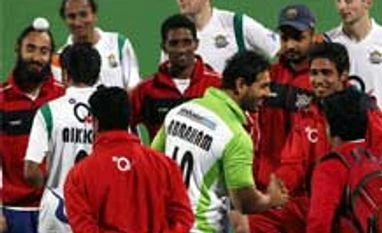Egging these games on are brands and companies which have sensed a budding business opportunity.
According to a recent report from CII-KPMG: "Globally, the leagues system has served as an important way for companies to enter the sports sector. A sports league creates several opportunities for private companies in domains such as league management, franchisee, broadcasting, advertising, infrastructure, player management, licensing and merchandising."
Also Read
While the IPL is due to conduct its 7th edition in April 2014, the Hockey India League (HIL) has just completed a successful second edition in February. The Indian Badminton League (IBL) conducted its inaugural edition last year. These two leagues cater to those who follow and play the game, attracting title sponsors in two-wheeler major Hero (hockey) and telecom leader Vodafone. The monies do not match up to the billions in IPL but interest levels in owning teams and sponsoring these leagues are only expected to grow.
Two new leagues are likely to provide further impetus.
The first one is the Indian Super League (ISL), for football, organised by a powerful combination of Reliance, Star India, and IMG, through a company called Football Sports Development, in which all three own equity stake.
Leading business groups such as the Piramals, Mahindra, GMR, Yes Bank, Ronnie Screwvala, Air Asia, and celebrities like Shahrukh Khan, John Abraham, Saurav Ganguly, among others are said to be in the fray, 30 bids for which have come in till date.
The other one is the International Premier Tennis League (IPTL), the brainchild of tennis star Mahesh Bhupathi. A multi-million dollar initiative spread across multiple countries. Nearly Rs 150 crores was committed as fees for top international players which included Rafael Nadal for the Mumbai team.
CP Thomas, co-founder, SportzPower, which tracks the business of sports, says, "IPL-style leagues is a unique format in the world of sports. Though it falls in the sportainment category, it ensures a quick fillip to the sport and provides value-for-money to brands."
With these imitation leagues all set to take off and Star India having announced an investment of over Rs 20,000 crore in sports, which includes money being put into the HIL, IBL and the ISL, there is a concerted effort to grow non-cricket sports.
The JSW Group has set up the Bengaluru Football Club, while the Piramals own the Pune Football Club, both in the I-League, which is currently the premier football league in the country. The Dabur group, apart from its investment in cricket through the IPL franchise Kings XI Punjab, also owns a team in HIL called Mumbai Magicians and one in IBL called Pune Pistons. Entrepreneur and media mogul, Ronnie Screwala has a sports venture, Unilazer Sports, after exiting from the media business.
Says Parth Jindal, who is overseeing JSW Group's sports division and CEO of Bengaluru FC: "There is a dearth of sporting facilities in India and a lot of potential for sports development in other sports such as football and athletics." JSW Group is setting up a sports academy in Bangalore, India which will provide facilities for coaching sports activities such as football, athletics, squash.
Even though the Jaypee Group burnt its fingers by bringing Formula One into India, only to be dropped after three years from the annual circuit by the global governing body, it is investing in other sports. The Jaypee Integrated Sports facility in Noida, houses an Olympic-size swimming pool, badminton, hockey, and tennis courts. The group owns the Jaypee Punjab Warriors, a hockey team from Punjab, which competes in the HIL.
Says Askari Zaidi, senior VP, Jaypee Group, "There's no dearth of talent in the country. There is lack of facilities at many levels and we are setting up facilities."
Sports also provides multiple opportunities for companies for branding. If they own a team, they can promote a brand more successfully. The IPL, apart from its principal sponsors has 50-60 brands associated with the various teams. According to the CII-KPMG report, sponsorship accounts for 21 per cent of the revenues for franchises, second only to media rights which leads with 43 per cent.
Cricket is a costly affair. "The new sports leagues that are springing up create sponsorship opportunities at price-points that are less expensive than cricket for brands and corporates to consider," says Krishnamachar.
You’ve reached your limit of {{free_limit}} free articles this month.
Subscribe now for unlimited access.
Already subscribed? Log in
Subscribe to read the full story →

Smart Quarterly
₹900
3 Months
₹300/Month
Smart Essential
₹2,700
1 Year
₹225/Month
Super Saver
₹3,900
2 Years
₹162/Month
Renews automatically, cancel anytime
Here’s what’s included in our digital subscription plans
Access to Exclusive Premium Stories
Over 30 subscriber-only stories daily, handpicked by our editors


Complimentary Access to The New York Times
News, Games, Cooking, Audio, Wirecutter & The Athletic
Business Standard Epaper
Digital replica of our daily newspaper — with options to read, save, and share


Curated Newsletters
Insights on markets, finance, politics, tech, and more delivered to your inbox
Market Analysis & Investment Insights
In-depth market analysis & insights with access to The Smart Investor


Archives
Repository of articles and publications dating back to 1997
Ad-free Reading
Uninterrupted reading experience with no advertisements


Seamless Access Across All Devices
Access Business Standard across devices — mobile, tablet, or PC, via web or app



)
